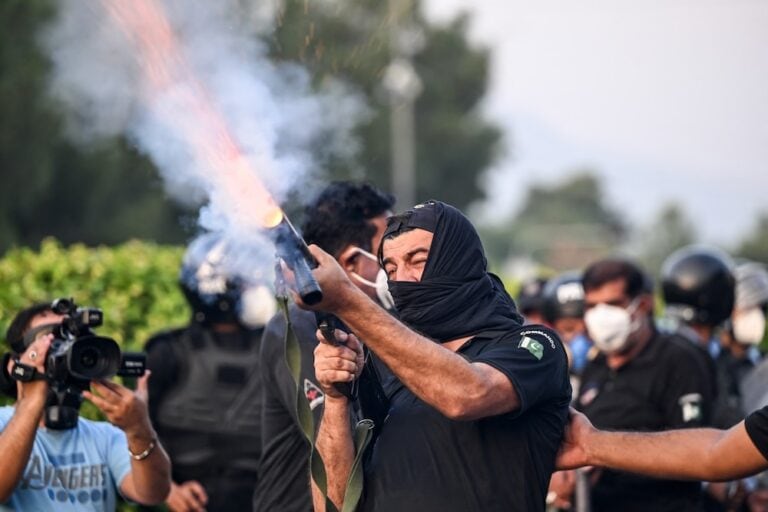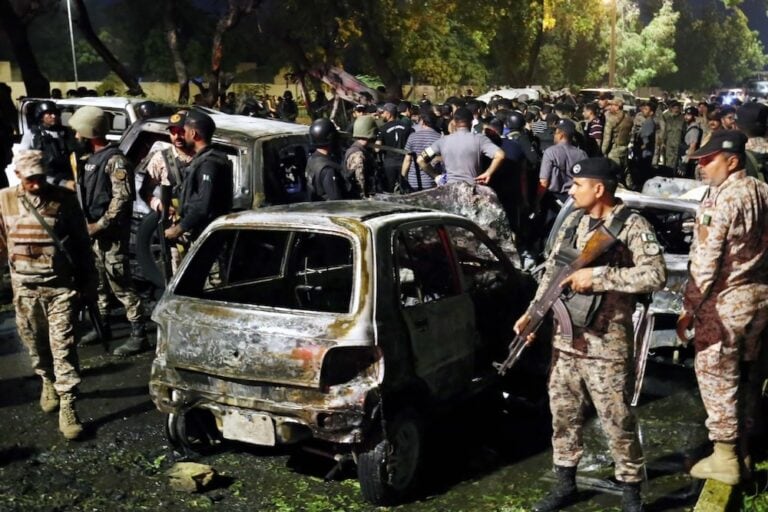Najam Sethi, the former editor-in-chief of the "Daily Times", was honoured for his defence and promotion of press freedom under difficult circumstances and constant personal danger.
(WAN-IFRA/IFEX) – Hyderabad, India, 1 December 2009 – Najam Sethi, the former Editor-in-Chief of the Daily Times in Pakistan, has been awarded the 2009 Golden Pen of Freedom, the annual press freedom prize of the World Association of Newspapers and News Publishers (WAN-IFRA).
In accepting the Golden Pen, Mr Sethi said the award “reflects the fierce commitment and courage of South Asia’s free media to the perennial quest for reporting the truth and analyzing it without fear or favour.”
Mr Sethi, known as an advocate of liberal and secular ideas in a country too-often torn by religious extremism, was honoured for his outstanding defence and promotion of press freedom under difficult circumstances and constant personal danger.
The award was presented Tuesday (1 December) during the opening ceremony of the World Newspaper Congress, World Editors Forum and Info Services Expo 2009, the global summit meetings of the world’s press being held in Hyderabad, India. The audience included Indian President Pratibha Devi Singh Patil, other dignitaries, and more than 900 publishers, chief editors, managing directors and other senior newspaper executives from 87 countries and their guests.
“Najam Sethi has managed to anger both the extremists and the government authorities, merely by doing his job, and this is at the heart of why WAN-IFRA is honouring him today with its Golden Pen of Freedom award for carrying out his role as an independent journalist, for reporting and investigating all sides equally, and for being a voice of moderation, despite the continuous threats and constant danger he faces,” said Xavier Vidal-Folch, President of the World Editors Forum, who presented the award.
Mr Sethi’s home and office are under constant guard. The Taliban threatened to kill him if he did not change his editorial policy. He has also received death threats from radical Muslim groups after he published a cartoon that depicted Umme Hassaan, principal of a radical women’s school, “educating” female students to wage jihad and embrace martyrdom.
Mr Sethi was imprisoned on 8 May 1999 for “anti-national activities” after he participated in a BBC documentary in which he spoke negatively of then-Prime Minister Nawaz Sharif and corruption in the Pakistani government.
He was released after six weeks and charges were dropped after an international outcry pressured Sharif’s government to release him.
Mr Sethi has long reported on corruption at the highest levels of Pakistan’s government.
He quit two of his editorial posts in October at The Daily Times and the Daily Aajkal because of the erosion of editorial independence, and he warned that it was “increasingly difficult for journalists to remain independent and bipartisan in the region.”
“Ironically enough, the rise of the private sector has brought its own set of constraints on traditional notions of editorship and professionalism,” said Mr Sethi, who remains Editor-in-chief of the Friday Times. “Increasingly, editors are managers rather than journalists, or journalists who are managers. And an overly aggressive corporate sector has replaced the government both as the most significant source of media revenue and the concomitant political pressure that goes with it, often at the expense of the public interest.”
WAN-IFRA has awarded the Golden Pen annually since 1961. Past winners include Argentina’s Jacobo Timerman (1980), South Africa’s Anthony Heard (1986), China’s Dai Qing (1992), Vietnam’s Doan Viet Hoat (1998), Zimbabwe’s Geoffrey Nyarota (2002), and Iran’s Akbar Ganji (2006). The 2007 and 2008 awards both went to Chinese journalists, Shi Tao and Li Changqing.
Click here for a full list of laureates


